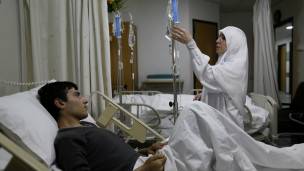Some would be feeding on grass and tree leaves to quell hunger and survive. Others would have consumed cats and dogs.
That is what is happening, according to some reports, in the Syrian towns besieged due to the civil war that has lashed the Arab nation for about five years and that so far has left more than 250,000 dead and millions of displaced.
The International Committee of the Red Cross (ICRC) warned that the situation in Madaya is "extremely desperate".
- The stories of Syrian children that became viral in 2015
- According to some humanitarian aid organizations operating in the region, in this city controlled by rebel forces and located 25 kilometers northwest of Damascus, the Syrian capital, some civilians are dying from shortages of food and medicines or trying to escape siege.In the north-western populations of Foah and Kefraya, which are in the hands of the government, the situation is also dramatic.The Syrian government announced on Thursday that it will allow the entry of assistance to Madaya.From the World Food Program of the United Nations Organization said that if access is allowed, the roads with supplies could reach the area next Monday.
- The tragic story of the Syrian woman who died with her 7 children trying to reach Europe
Site as a weapon of war
According to the UN, all parties to the Syrian conflict have used the sites of towns and cities as a strategy of war, which is a violation of the international humanitarian law.In Syria about 4.5 million people live in areas of difficult access, including 400,000 in 15 besieged places that do not have access to the supplies needed to survive.Madaya, which is located 11 kilometers from the border with Lebanon, has been besieged since early July by government forces and their allies of Hezbollah, the Lebanese Shiite Islamist movement.In mid-October, 21 trucks with humanitarian supplies and medicines were allowed into the town, where some 40,000 people are believed to live.- The arguments for and against bombing Islamic State in Syria
The conditions have worsened since then, with the arrival of winter and a break in attendance.CIRC spokesman Pawel Krzysiek told the BBC that he had visited Madaya recently and that the situation was already very difficult."People live there with the basics, now the situation is more desperate," he explained."Winter obviously makes things worse, with people looking for what they can to light their stoves, including plastic, which causes breathing problems."
Cats and dogs
 AP
AP
Krzysiek said that the CIRC has not been able to confirm how many deaths there have been in Madaya.
But the Syrian Observatory for Human Rights, a UK-based organization, said on Monday that ten people had died from lack of food in recent weeks and that another 13 had been shot by government loyalists or smashed by mines when They had left in search of food.
In addition, they assure that 1,200 people in the population have died of chronic diseases when they can not take medication and that more than 300 children were suffering from malnutrition and other ills.
"Citizens are dying, they are feeding on the ground, eating cats and dogs," an activist whose family lives in Madaya told the BBC.
The activist called on the UN for the international community to support the people of Madaya and open humanitarian corridors.
Observers say that the government reinforced Madaya's site in retaliation for the sites of Foah and Kefraya.
It is reported that the situation in these populations, which are mainly Shiite and in rebel hands, has also worsened since the fall in September of a government air base where helicopters carrying supplies could land.
An estimated 30,000 people are trapped in these locations and forced to eat grass and undergo operations without anesthesia, according to wounded government soldiers, who were evacuated in late December.
Pawel Krzysiek says it is the "urgent priority" of the Red Cross to bring food to Madaya, Foah and Kefraya in the days to come, but warned that access should be negotiated.
The government of Syria reported, however, that it will allow the entry of assistance to Madaya, in the coming days.
Jim Muir, a BBC correspondent in Beirut, believes that the decision of the Bashar al-Assad government will not end the suffering for Syrians living in besieged villages.
Muir points out that it is not clear why the case of Madaya has gained prominence in recent days, as there are other areas controlled by the rebels, such as some suburbs of Damascus, which have been besieged for longer.
According to our correspondent, perhaps Madaya has been easier to block completely than other locations, whose sites are more porous.
The cost of basic products in Madaya has skyrocketed in recent weeks, reaching, according to information received from the city, US $ 250 for a kilo of ground wheat and US $ 300 for 900 grams of powdered milk for babies.
Comments
Post a Comment